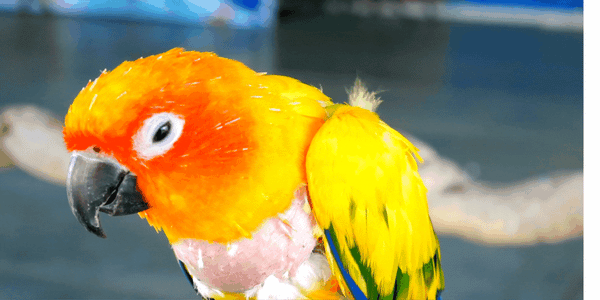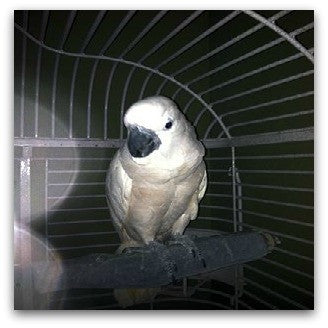Table of Contents

While surprisingly robust on the whole, birds seem fragile because they only show illness when they are in dire straits. But, if you've ever wondered, "is my bird breathing right? then, read on.
Birds instinctively hide their injuries and illnesses as a survival mechanism. If a wild bird acts sick, its own flock-mates will literally chase it off so that it may die in private thereby preventing danger to the entire flock. You see, one ill bird will attract a hungry predator in no time.
So, while hiding illness is a survival technique in the wild, it is both maddening for veterinarians and terrifying for owners who have experienced this first hand. Learn to read your pets body language.
If a pet dog is unwell he or she will actually look sick. Eyes will droop; your dog won’t be playful, won’t eat food and will be generally lethargic. He or she may sleep most of the day, or may whine repeatedly.
The point is that dogs and to some extent cats have less of a need to hide an illness. They have long been domesticated and trust us enough to know that we will help them if they communicate their illness to us.
Sick Pet Birds Hide Illness
Birds are not domesticated and they see us as the flock-mate that will evict them if they are ill. Therefore, we must be able to read a birds subtle body language and rely on careful observation of bird poop and weight loss to know if the bird is sick.
Human owners often miss the signs of distress illness and move to treatment too late. Learn to read your birds' body language and symptoms of declining health.
While this bird is a feather picker, you can tell by it's facial expression that it's sick. How is it holding it's body? It's Head? What do the look in it's eyes tell you? How about fluffed head feathers?
Why Is My Bird Breathing So Hard?
Labored breathing in birds can be a sign of underlying health issues that demand immediate veterinary attention. Causes may include respiratory infections, heart complications, or environmental stressors such as poor air quality. Consulting a veterinary professional ensures precise diagnosis and tailored treatment, enhancing your feathered companion's well-being and vitality. Remember, early intervention plays a pivotal role in securing their health and happiness.

The bird on the right is clearly sick. Ask yourself, "what looks different about this bird?" This birds body language says "I'm in distress!!" with it's wings pulled back and puffy cheeks.
Look at it's eyes. It looks forlorn. The eyes are not bright. In fact, it looks as though it is having difficulty keeping them open.
Look at it's stance. This poor bird is not standing erect or alert. It looks as though it could fall over any minute.
See it's center Keel Bone protruding? This bird has minimal body fat. This bird is clearly sick. If your bird has some or any of these symptoms you should get him or her to the vet immediately. Your avian vet will strive to stabilize your bird and uncover other issues.
-
Nutritional Deficiencies: Inadequate nutrition can lead to respiratory distress in birds. Deficiencies in essential nutrients like vitamin A or vitamin D can weaken their immune system and respiratory function, making them more susceptible to illnesses. A veterinarian can provide dietary recommendations and supplements to address these deficiencies and improve your bird's overall health.
-
Toxic Exposures: Birds are highly sensitive to airborne toxins, such as fumes from non-stick cookware, aerosol sprays, or cigarette smoke. Inhaling these substances can cause respiratory irritation and difficulty breathing. Prompt veterinary care is essential to assess the extent of exposure and provide appropriate treatment to minimize the effects of toxicity on your bird's respiratory system.
-
Heart Disease: Like humans, birds can also suffer from heart conditions that impact their breathing. Heart disease can lead to fluid accumulation in the lungs (pulmonary edema) or decreased oxygen delivery to tissues, resulting in labored breathing. A veterinarian can conduct diagnostic tests, such as X-rays or echocardiograms, to evaluate your bird's heart health and recommend medications or management strategies to alleviate symptoms and improve cardiac function.
Each of these examples underscores the importance of seeking veterinary care when you notice abnormal breathing patterns in your bird. By addressing the underlying cause promptly, you can help your feathered friend recover and enjoy a better quality of life.
Signs that your bird is having difficulty breathing:
1. Tail bobbing up and down.
While birds breathe the same air that we do through their lungs, there is very little else about how they breathe that is similar to humans. Humans have lungs that act as a bellows. The diaphragm created a vacuum in the chest forcing air into the lungs to fill the empty space. The diaphragm then contracts, compressing the chest and forcing the air back out. In this way we are constantly filling and refilling our lungs.
Birds don’t have a diaphragm and their lungs remain open virtually all of the time. Breast muscles compress the chest which forces air into the air sacs that reside in the bones in the wings.
The above video offers you an in depth look at how birds breath: The point is that when a bird is distressed it is unable to use its chest muscles to force air in and out of the lungs. To facilitate breathing a bird will instead use the posterior muscles causing the tail to bob up and down.
If you see this happening your bird needs an emergency to visit the vet immediately. DO NOT WAIT.
2. Wheezing or gasping.
While breathing, your bird should make very little if any sound. The presence of gasping, snuffling or wheezing is all indicative of having difficulty breathing and should be treated immediately. Also watch for sneezing and coughing.
3. Breathing with mouth open.
Ideally, your bird will be breathing through the nares. If they are blocked by mucus due to infection then your bird will attempt to breathe through its mouth. This should be taken as an immediate sign that your bird is ill and as always, a trip to the vet is in order.
4. Coughing or has a voice change.
If your bird has a voice change and is coughing a lot, that is a tale tale sign of breathing difficulties. With the unnatural use of a tail bob to breath, your bird may be taking in too much air causing even more irritation to the throat and lungs. Coughing is a sign of congestion.
5. Nasal Discharge.
Whether accompanied by sneezing and coughing or not, nasal discharge is a symptom that needs immediate attention.
6. Bluish tone to skin - Cyanosis.
This is a sign of oxygen deprivation.
TAKE AWAY'S:
ANY OF THE ABOVE SYMPTOMS ARE SERIOUS AND POTENTIALLY LIFE THREATENING.
If you see any of these breathing difficulty symptoms, put your bird in a hospital cage and offer immediate General Supportive Care. Transport your bird to the avian vet or emergency facility FAST Your Avian Vet will stabilize the bird and find the cause of breathing difficulties to administer treatment.
How to provide general supportive care to your bird
Any time that your bird is breathing hard it is a medical emergency. Your bird’s emergency condition will benefit from general supportive care until you can reach your avian veterinarian.
Create a hospital cage in a clean bird carrier or an aquarium such as food, water, and a perch.
Keep your bird warm by setting the carrier on a heating pad set to a low setting. Don't use a heat lamp as it will be too harsh for a bird who is experiencing a medical emergency.
General supportive care for your bird includes:
- Place your bird in the hospital cage, ensuring the temperature remains between 80 - 85℉
- Provide easily accessible food and water
- Provide normal ambient light throughout the day, to encourage eating and drinking
- Avoid handling your bird, unless absolutely necessary to keep her calm and quiet
- Monitor your bird for changes
- Keep a log of what happened and how you've tried to stabilize your bird.
CALL YOUR AVIAN VETERINARIAN: When asked if this is a medical emergency answer yes. Tell them that your bird is in respiratory distress. Ask for priority service when you arrive and provide the office with an ETA.
TAKE AWAY'S:
ANY OF THE ABOVE SYMPTOMS ARE SERIOUS AND POTENTIALLY LIFE THREATENING.
If you see any of these breathing difficulty symptoms, put your bird in a hospital cage and offer immediate General Supportive Care. Transport your bird to the avian vet or emergency facility FAST Your Avian Vet will stabilize the bird and find the cause of breathing difficulties to administer treatment.
Related Posts:
How To Tell If Your Bird Has Been Poisoned
How To Help A Bird With Respiratory Problems
D-R-O-P Approach To Bird Burns
How To Make a Parrot Hospital Cage
References:
Household Hazards for Pet Birds - Merck Veterinary Manual
10 Everyday Items That Are Toxic to Birds
Burkett, G. Avian First Aid: Be Your Birds First Responder DVD.
Household Hazards and Dangers to Birds
Rach, J. First Aid for Birds. Howell Book House; New York, NY, 1998.
Hawcroft, Tim, BVSc, MACVSc, MRCVS. First Aid for Birds: The Essential Quick-Reference Guide. Lansdowne Publishing Ltd. 1994.
https://ervets4pets.com/avian-emergencies-signs-of-sickness-in-your-bird/
Diane Burroughs, LCSW is a licensed psychotherapist trained in ABA therapy techniques. She specializes in avian anxiety disorders and is certified in Nutrition For Mental Health. Diane has written a number of bird behavior books and she offers behavior consultations. She's developed a range of UnRuffledRx Science-backed Parrot Wellness Supplies.
Diane's products have been featured in the Journal of Avian Medicine and Surgery and at Exoticscon, a conference for exotic pet veterinarians. Her bird collars & supplements are stocked in avian vet clinics and bird stores throughout the US. With over 30 years in the field of behavior, Diane has created thousands of successful individualized behavior plans that help pets thrive.
TAGS: #
HowTohelpABirdWithRespiratoryProblems #BirdBreathingHard
SHARING IS CARING! PLEASE SHARE ON YOUR FAVORITE SOCIAL MEDIA NOW!














